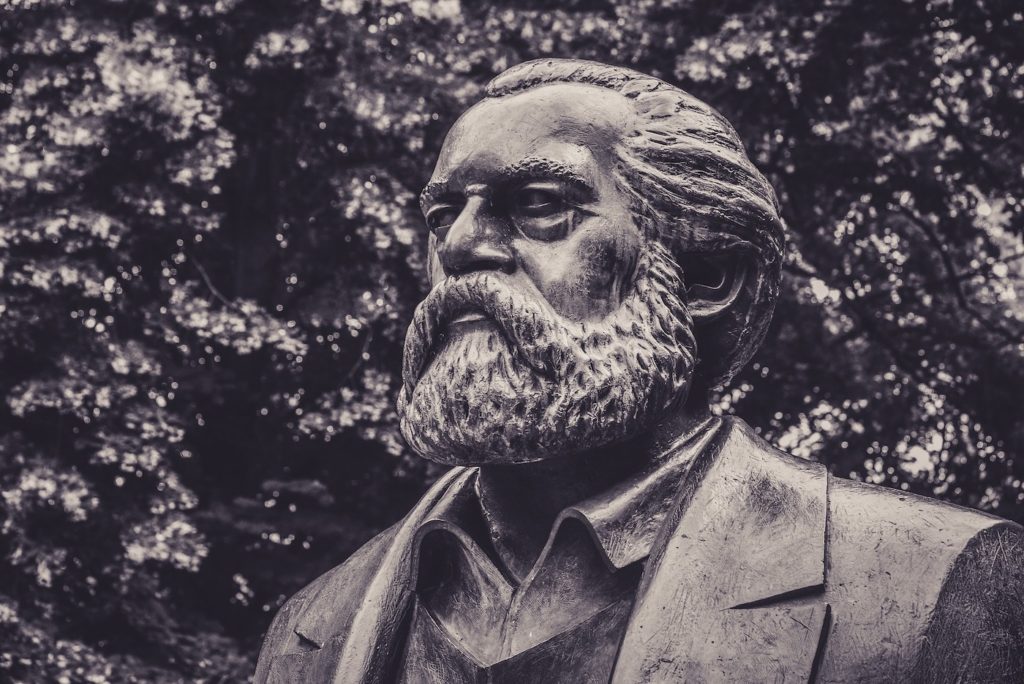On the one hand, Karl Marx wrote of the inevitability of socialism. But on the other hand, he organized a socialist movement, a socialist party, declared again and again that his socialism was revolutionary, and that the violent overthrow of the government was necessary to bring about socialism. –Ludwig von Mises
Sunday marks exactly three full decades after the fall of the Soviet Union. This anniversary arrives at a portentous time when Marxist critiques of capitalism are becoming relevant again. Across the political spectrum, capitalism is under attack: critics cite rising economic inequality, deadly pandemic, and the concentration of power in the hands of Big Tech companies as a reason for moving toward “democratic socialism” or “national conservatism.” But, while capitalism is not perfect, the Marxist critique of capitalism suffers from structural defects and is therefore unable to offer a plausible alternative to capitalism. Three decades after the collapse of the state explicitly based on Marxist ideas, it is important to remember the limitations of Marxist theory that led to the failure of its economic model.
In his magnum opus Capital, Marx aimed to “lay bare the economic law of motion of modern society.” Society “can neither clear [these economic laws] by bold leaps, nor remove [them] by legal enactments, the obstacles offered by the successive phases of its normal development.” Marx argued that capitalism would inevitably destroy itself because of the unstoppable economic forces that direct it: these economic forces are a “universal energy which breaks through every limitation and bond and sets itself up as the only policy, the only universality, the only limitation, and the only bond.” Karl Marx was, to use the terminology of Karl Popper, a historicist: he believed in the existence of inexorable, unbending, timeless, and universal laws of historical development, unchanging rules of change, “tendencies working with iron necessity towards inevitable results,” as Marx called them.
The historical record, however, has proved Marx wrong: the theoretical assumptions of his theory have been invalidated, so too the communist revolution he prophesied. But apart from the problems of Marx’s theory, there is another reason why he is a false prophet: by nature, human events have a reflexive quality; and, similarly, open societies react to the new information they learn.
Start your day with Public Discourse
Sign up and get our daily essays sent straight to your inbox.While Marx saw revolution as inevitable, his followers precluded upheaval because their governments peacefully met their demands.
Paradoxically, communist revolutionaries like Vladimir Lenin and Mao Zedong, as well as socialist and social democratic parties across the globe, are the reason why Marx’s prophecy has been invalidated. The more aggressive and active revolutionaries are, the more fear they instill in existing governmental authority, and the more governments seek to regulate capitalism and rein in its excesses to ensure that society’s radical elements did not gain popularity. This is especially true in open societies, which are better at reacting to the needs of their citizens than dictatorships (which also probably explains why communist revolutions occurred not in Western liberal democracies but in autocracies such as Russia and China). While Marx saw revolution as inevitable, his followers precluded upheaval because their governments peacefully met their demands.
The Advent of Regulated Capitalism
Reflexivity, the process whereby perception affects actions, undermined Marx’s historicist framework. Historicism holds that we can discover universal laws of history, just as in physics, and make prophecies based on them. And because Marx believed politics is impotent and that everything depends entirely on economic conditions, he overlooked the state’s political power and its ability to execute change.
In natural sciences, statements made about the world do not have any effect on reality. We have discovered the Newtonian laws of motion of celestial bodies, yet this revelation did not change these motions or their rules. On the other hand, if we discover a certain social pattern or “law” that forecasts undesirable events or simply reveals something about society, we might respond to this knowledge and take actions that alter the conditions on which the original analysis was based—which means that the original law is now defunct.
For example, it is logically impossible for us to find precise, physics-like laws of business cycles or movement of prices in the financial markets. If we did find these laws, then our behavior would change, thereby changing reality and rendering the original laws invalid. The social world is reflexive: reality is affected by our understanding. Universal laws, and prophecies based on them, are logically impossible.
In the words of John Kenneth Galbraith, “Marx profoundly affected those who did not accept his system. His influence extended to those who least supposed they were subject to it.” “Capitalists” became aware of Marx’s ominous forecast, and thus the government started a revolution from the top by beginning to regulate capitalism and terminating its negative sides, such as child labor or subsistence-level wages. Revolution eventually became unnecessary. As Otto von Bismarck, chancellor of Germany, who was one of the first statesmen to introduce a welfare state in the West, put it, “If there is to be revolution, we would rather make it, than suffer it.”
Since the appearance of Marxism, social security well-being has improved significantly; indeed, many of The Communist Manifesto’s demands have been met in advanced Western economies, such as “a heavy progressive or graduated income tax” (including in the United States), “centralisation of credit in the hands of the state, by means of a national bank with State capital and an exclusive monopoly,” “centralisation of the means of communication and transport in the hands of the State,” “free education for all children in public schools,” “abolition of children’s factory labour in its present form,” and more.
Since the appearance of Marxism, social security well-being has improved significantly; indeed, many of The Communist Manifesto’s demands have been met in advanced Western economies.
Without a doubt, Marx’s ideas were not the only catalyst of these reforms, but their role in creating an atmosphere thick with the possibility of proletarian revolution and a sense of urgency for reforming the system cannot be understated. Since the late nineteenth century, public social spending in the developed world has been increasing steadily: in 1890, this number was 0.83 percent for the United Kingdom and 0.45 percent for the United States. In 2016, it was 21.49 percent for the UK and 19.32 percent for the U.S. The world’s GDP per capita increased more than tenfold since 1870, Western Europe’s sixteen-fold. Global economic inequality has fallen in the past few decades, while the level of economic inequality in the U.S., adjusted for fiscal transfers from the rich to the poor and on a per capita basis, has remained flat since the 1960s, contrary to popular belief.
The advent of regulated capitalism brought us unprecedented wealth and prosperity. By mitigating the negative effects of unfettered laissez-faire, we did not only make Marx irrelevant but also attained tremendous progress. In fact, at the time of Marx’s death in 1883, the average Englishman was three times richer than in 1818, the year in which Karl Marx was born.
And in recent decades, it’s not just the Left that supports the welfare state. Even libertarians like Milton Friedman and Friedrich Hayek endorsed a negative income tax and social insurance scheme, respectively. Capitalism, with its ability to adapt and reform itself, turned out to be more durable than the original Marxists envisioned.
Marxism’s Fatal Flaw
Marx saw his analysis as an unconditional prophecy as opposed to conditional scientific predictions. But, as philosopher of science Karl Popper wrote in The Poverty of Historicism, historicism’s laws of development “turn out to be absolute trends; trends, which, like laws, do not depend on initial conditions,” even though there are “countless possible conditions.” The historicist, writes Karl Popper, “firmly believes in his favourite trend, and conditions under which it would disappear are to him unthinkable. The poverty of historicism is the poverty of imagination. The historicist continuously upbraids those who cannot imagine a change in their little worlds; yet it seems that the historicist is himself deficient in imagination, for he cannot imagine a change in the conditions of change.”
Put differently, Karl Marx did not consider the possibility that the conditions on which his forecast was originally based were subject to change. Marx’s prophecy was about the evolution of unfettered laissez-faire capitalism. He did not expect that the state, influenced (ironically) by his historicist ideas, could avoid revolution and replace a laissez-faire system with a regulated market economy. Of course, Marx’s analysis and predictions could have played out under unrestricted laissez-faire capitalism. But unregulated markets just did not remain around long enough since, under Marx’s influence, they were replaced by regulated capitalism.
Karl Marx did not consider the possibility that the conditions on which his forecast was originally based were subject to change.
For Marx, thoughts and ideas were just “ideological superstructures on the basis of economic conditions,” according to Popper. External conditions are sovereign over people’s thoughts and actions. Human thought and action have no impact on reality because reality is driven entirely by laws of historical destiny. Marx, as noted earlier, ascribed to the primacy of economic motives the inability of political action to alter the course of events.
Marx saw the political views and actions of the government of the bourgeoisie as determined by their class status. Because the government represented the interests of capitalists, Marx thought, they would never undertake any action that would somehow limit their influence and wealth. But reflexivity teaches that ideas and reality have reciprocal influence on each other, as do economics and politics. In a society of reflecting, thinking beings, ideas inspire actions that lead to changes in reality.
The Latent Revolution?
Marx famously wrote that society could “neither overleap the natural phases of its evolution, nor shuffle them out of the world by a stroke of the pen”: we could only “shorten and lessen the birth pangs.” For Marx, we cannot alter the course of these inexorable forces of historical destiny from the outside, trying to bend the arc of history. We can only mitigate the negative effects of new developments.
Later, however, as he noticed how revolutionary movements were gradually shaping governments, Marx began to doubt whether politics really was impotent. The revolution has indeed been occurring—but not abruptly, as in the original prophecy, but over a long period of time and via peaceful and legal means. Initially, Marx considered all progress for laborers a mere prelude to the bigger revolution, but later he deemed a peaceful transition to communism possible. We may implement reforms that mitigate the negative consequences of social upheaval. We can aid history as it unfolds according to the laws of social development.
For Marx, we cannot alter the course of these inexorable forces of historical destiny from the outside, trying to bend the arc of history. We can only mitigate the negative effects of new developments.
The vagueness of Marx’s observation, however, allows for a variety of interpretations. Perhaps Marx meant that everything, including our efforts to stem the actualization of the prediction, are part of the forecast itself. The actions that brought about social reforms have indeed “shortened and lessened the birth pangs” by making the revolution unfold not suddenly, but gradually—similar to the ancient myth of Oedipus, in which the prophecy itself contributed to its own actualization.
Therefore, the measures that “tamed” the excesses of laissez-faire capitalism prevented the communist revolution and actualized a considerable portion of Marx’s programme. Karl Marx’s prophecy has been both invalidated and materialized due to its appearance. Marxism has prevented the communist revolution by bringing us closer to Karl Marx’s vision of an ideal society. This is the main paradox of Karl Marx’s prophecy—it has been, and probably will continue to be, both self-defeating and self-fulfilling.













